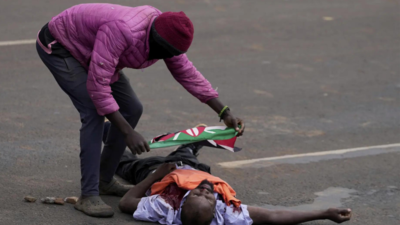ARTICLE AD BOX

Clashes on Nairobi outskirts as police block marchers(AP Photos)
Nairobi: Police blocked roads in a show of force to deter anti-government marchers from the deserted streets of Kenya's usually bustling capital on Monday, with small groups of protesters clashing with officers on Nairobi's outskirts.Many people appeared to be staying home rather than attend the annual so-called Saba Saba Day, meaning Seven Seven, marches to commemorate July 7, 1990 when Kenyans rose up to demand a return to multi-party democracy after years of autocratic rule by then-president Daniel arap Moi.From around midday, AFP saw running battles with groups of anti-riot police who fired teargas at small gatherings, with some of the crowd throwing rocks at officers and engaging in destructive looting.Young Kenyans, frustrated over economic stagnation, corruption and police brutality, are once again engaging in protests that last month degenerated into looting and violence, leaving dozens dead and thousands of businesses destroyed.Protesters accuse the authorities of paying armed vandals to discredit their movement, while the government has compared the demonstrations to an "attempted coup".On Monday, the streets of central Nairobi were quiet after police mounted roadblocks on the main roads, restricting entry to areas that were the epicentre of previous rallies.
Many businesses were closed for the day."I have never witnessed the city centre like this," security guard Edmond Khayimba, 29, told AFP.While the centre remained deserted, groups gathered on the outskirts in the afternoon with AFP reporters witnessing two people wounded, as well as looting and vandalism.Protesters on a major highway clashed with police blocking their entry into the city, with the small crowds chanting: "Ruto Must Go", a popular rallying cry against President William Ruto, and "wantam" meaning "one term".Again, AFP saw looting and property destruction in the surrounding area.With much of Nairobi at a standstill, an interactive map showing at least 20 suspected police roadblocks was shared online and through WhatsApp groups.Local TV stations also showed gatherings, some violent, in several towns across the country.
- 'Ruto Must Go' -
Social media and rising economic expectations have fanned anger over inequalities in a country where around 80 percent are trapped in informal, poorly paid jobs.But a crackdown by the police -- at least 80 people have died in protests since June last year while dozens have been detained illegally -- has scared many off the streets.On Sunday, men, some armed with sticks, forced their way into the compound of the Kenyan Human Rights Commission during a press conference calling for an end to "enforced disappearances and extrajudicial killings".Nairobi motorbike driver Rogers Onsomu, 32, told AFP that while the town was deserted, he hoped demonstrators would come out later, and criticised Ruto's government."What he has promised the country, (he) is not delivering," Onsomu said."The youths are protesting because of many things, like healthcare.""As the constitution say, the power belongs to people," he said. "So this slogan of 'Ruto Must Go'. We will not relent and we will keep it going each and every day."
- 'The world is different' -
Since being elected in 2022, Ruto has forged an uneasy alliance with the main opposition leader Raila Odinga, leaving no clear challenger ahead of the next vote in 2027.But each violent crackdown fuels further unrest, said activist Nerima Wako."Every time people organise a protest, they kill more people, so it just continues to feed off itself," she said.The previous demonstration on June 25 -- intended to mark the peak of last year's deadly anti-government rallies -- turned violent and left 19 people dead, according to rights groups.Police made hundreds of arrests.Gabrielle Lynch, an African politics expert at Britain's University of Warwick, said the government appeared to be recycling tactics from the 1990s."But we're not in the nineties," she said. "They don't seem to have realised the world is different."



.png)
.png)
.png)
















 3 hours ago
5
3 hours ago
5









 English (US) ·
English (US) ·